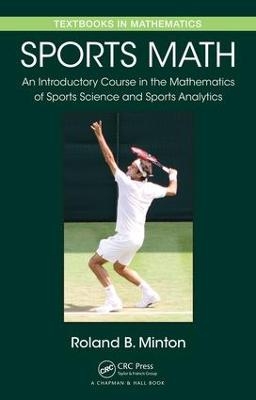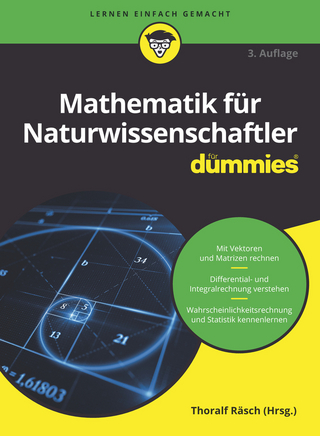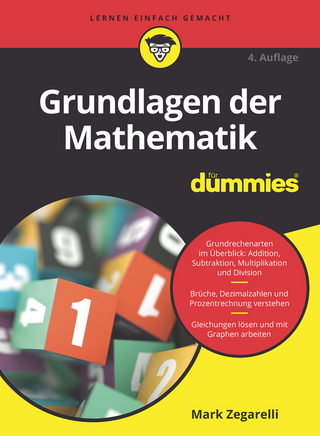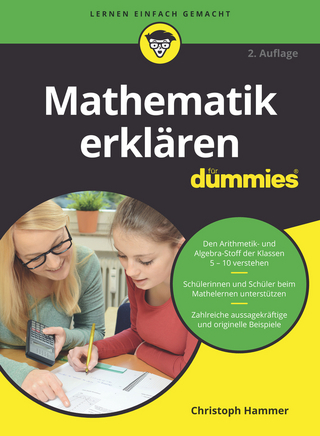
Sports Math
An Introductory Course in the Mathematics of Sports Science and Sports Analytics
Seiten
2016
Chapman & Hall/CRC (Verlag)
978-1-4987-0626-1 (ISBN)
Chapman & Hall/CRC (Verlag)
978-1-4987-0626-1 (ISBN)
Can you really keep your eye on the ball? How is massive data collection changing sports?
Sports science courses are growing in popularity. The author’s course at Roanoke College is a mix of physics, physiology, mathematics, and statistics. Many students of both genders find it exciting to think about sports. Sports problems are easy to create and state, even for students who do not live sports 24/7. Sports are part of their culture and knowledge base, and the opportunity to be an expert on some area of sports is invigorating. This should be the primary reason for the growth of mathematics of sports courses: the topic provides intrinsic motivation for students to do their best work.
From the Author:
"The topics covered in Sports Science and Sports Analytics courses vary widely. To use a golfing analogy, writing a book like this is like hitting a drive at a driving range; there are many directions you can go without going out of bounds. At the driving range, I pick out a small target to focus on, and that is what I have done here. I have chosen a sample of topics I find very interesting. Ideally, users of this book will have enough to choose from to suit whichever version of a sports course is being run."
"The book is very appealing to teach from as well as to learn from. Students seem to have a growing interest in ways to apply traditionally different areas to solve problems. This, coupled with an enthusiasm for sports, makes Dr. Minton’s book appealing to me."—Kevin Hutson, Furman University
Sports science courses are growing in popularity. The author’s course at Roanoke College is a mix of physics, physiology, mathematics, and statistics. Many students of both genders find it exciting to think about sports. Sports problems are easy to create and state, even for students who do not live sports 24/7. Sports are part of their culture and knowledge base, and the opportunity to be an expert on some area of sports is invigorating. This should be the primary reason for the growth of mathematics of sports courses: the topic provides intrinsic motivation for students to do their best work.
From the Author:
"The topics covered in Sports Science and Sports Analytics courses vary widely. To use a golfing analogy, writing a book like this is like hitting a drive at a driving range; there are many directions you can go without going out of bounds. At the driving range, I pick out a small target to focus on, and that is what I have done here. I have chosen a sample of topics I find very interesting. Ideally, users of this book will have enough to choose from to suit whichever version of a sports course is being run."
"The book is very appealing to teach from as well as to learn from. Students seem to have a growing interest in ways to apply traditionally different areas to solve problems. This, coupled with an enthusiasm for sports, makes Dr. Minton’s book appealing to me."—Kevin Hutson, Furman University
Roland Minton is professor of Mathematics at Roanoke College, Salem, Virginia. He has taught courses in sports science since 1987.
Projectile Motion. Rotational Motion. Sports Illusions. Collisions. Rating Systems. Voting Systems. Saber- and Other Metrics. Randomness in Sports. In-Game Strategies. Predictive Analytics.
| Erscheinungsdatum | 24.05.2016 |
|---|---|
| Zusatzinfo | 42 Tables, black and white; 97 Illustrations, black and white |
| Sprache | englisch |
| Maße | 156 x 234 mm |
| Gewicht | 560 g |
| Themenwelt | Mathematik / Informatik ► Mathematik ► Allgemeines / Lexika |
| Mathematik / Informatik ► Mathematik ► Angewandte Mathematik | |
| Weitere Fachgebiete ► Sportwissenschaft | |
| ISBN-10 | 1-4987-0626-6 / 1498706266 |
| ISBN-13 | 978-1-4987-0626-1 / 9781498706261 |
| Zustand | Neuware |
| Haben Sie eine Frage zum Produkt? |
Mehr entdecken
aus dem Bereich
aus dem Bereich


